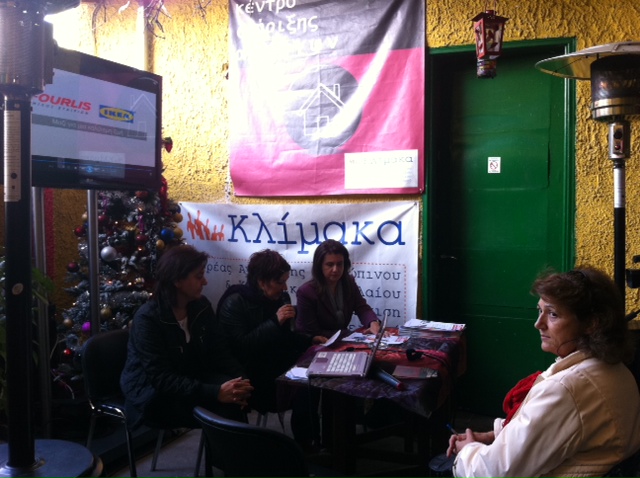Anastasia Balezdrova
The unofficial data of the "Klimaka" organization show that the number of homeless people in Greece is 20 thousand and in addition to the lack of housing, their most serious problems are the lack of health services, employment and personal hygiene.
The discussion about the homeless people in Greece began only in early 2012, during the bitter cold when there were calls in the social and some traditional media to help the people sleeping on the streets.
No one knows their exact number in fact, but a stroll in downtown Athens can certainly convince even the most distrustful that it has increased.
According to the "Klimaka" non-profit organization, which deals with the issues of the homeless people and fights against social exclusion, their number in Greece is about 20 thousand and they are concentrated in large urban centres. Representatives of the organization stressed that this figure includes not only the people who live on the street, but also those who live in poor and inadequate conditions.

"Until a few months ago, the state had shut its eyes to them. In February, a law was passed that does not provide a solution to the problem but only alleviates the situation somewhat. It leaves aside the homeless people who are undocumented immigrants and offers no prevention measures and even fewer measures for their reintegration into society," said Ada Alamanou, who is in charge of the programme in support of homeless people.
The head of "Klimaka" and psychiatrist, Kyriakos Katsadoros, added that no scientific studies on the causes that have contributed to the increasing number of people who remain without a shelter have been carried out in Greece.
"Klimaka," however, has been monitoring the development of the phenomenon since 2001, "when the majority of people in Greece believed that the problem did not exist." Today, they presented their study "Homeless in Greece in 2012," which aims to present the profile of homeless people in the country during the economic crisis.
The study was carried out from September 2011 to February 2012 among 214 people - Greeks and foreigners living in the country for more than eight years, the ratio being 90% to 10%.
The results show that the majority of the homeless people are male - 82.2% and 17.8% female. Over 80% are in their most productive age - between 26 and 55 years.
More than half of them, or 52.3%, have primary education, 25.2% - secondary, 19.6% - higher and only 2.5% are illiterate.
42% are not married, 33% are divorced and 12% are married. 47% say they have children who are not living with them or are unable to help them.
The majority of the new homeless people were employed in construction and technical professions in the past. The second group includes employees in various private companies and the third one - in the tourism industry. "No one among the homeless people we met was a public worker. There is a small percentage of people who had professional relations with the public sector," said researcher Olga Theodorikakou.
And here is today's reality of the people whose life was completely normal until yesterday:
30.2% spent at least one night in prison last year. Half of them arrived there for financial reasons.
63.8% sleep only in the open and 10.5% spend the night in a car. 14.3% visited a hospital at least once to seek shelter during the cold nights.
The homeless population is concentrated in the historic centre of Athens and in Piraeus. "That does not mean that there are no homeless people in the northern and southern suburbs, especially during the summer period."
When asked about their most essential needs, the homeless people stated: the lack of a home - 85.6%, the lack of health care - 83.1%, the lack of work - 76.5%, the lack of personal hygiene – 75%.
Indicative of the main reason for their new status is the fact that 64.8% became homeless less than two years ago, i.e. at the beginning of the crisis. One-third of the homeless people have been victims of assault at least once, 44.1% have been robbed and 50% fear for their safety. At the same time, 21.05% of homeless women have been victims of sexual abuse at least once since they have been on the streets.
Homeless people in Greece survive with 0 to 20 euro per month, which they obtain with help from relatives, friends or anyone else. "Those who are entitled to social security benefits are literally rich. It is very difficult for them to find a temporary job given the general state of the labour market and the economy," said the researcher.
52.4% state that making their living is not a daily issue. 47.1% say that finding clothes is not difficult. At the same time, 41% say it is difficult to find a place where they can have a wash.
In 63.5% of cases, the families of the homeless people know about their condition and in 67.5% of the cases, their relatives are indifferent or hostile to them. 20.4% of homeless people say that there are mentally ill people in their families.
45.2% say they have no friends but 34.3% state they have sexual contacts. 58.1% have no health insurance.
18.1% have tried to commit suicide at least once, 38.1% use alcohol frequently, 14.3% use drugs - mostly marijuana, and 20.8% have been dependent on gambling in the past. 48.5% are often very pessimistic about their existence.
When asked why they ended up on the street, 29.8% said for financial reasons and 17.3% because of unemployment. However, 79.8% of the new homeless people believe that their situation may change.